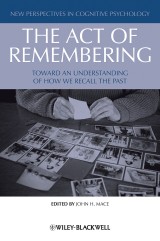Details

The Act of Remembering
Toward an Understanding of How We Recall the PastNew Perspectives in Cognitive Psychology, Band 3 1. Aufl.
|
42,99 € |
|
| Verlag: | Wiley-Blackwell |
| Format: | EPUB |
| Veröffentl.: | 07.07.2011 |
| ISBN/EAN: | 9781444351712 |
| Sprache: | englisch |
| Anzahl Seiten: | 416 |
DRM-geschütztes eBook, Sie benötigen z.B. Adobe Digital Editions und eine Adobe ID zum Lesen.
Beschreibungen
The first volume devoted solely to autobiographical memory retrieval, <i>The Act of Remembering</i> serves as a primer of ideas, methodology, and central topics, and lays the groundwork for future research in the field. <ul> <li>Contains new, forward-looking theories from leading international scholars</li> <li>Answers questions such as: Do we retrieve memories according to when and where we need them? How much conscious control do we have over what we remember? Why are some people more likely than others to have intrusive ‘flashbacks’ following a stressful event?</li> <li>Pays particular attention to voluntary and involuntary recall</li> </ul>
Preface. <p>Contributors.</p> <p><b>Part I: Introduction.</b></p> <p>1. The act of remembering the past: An overview (<i>John H. Mace, Eastern Illinois University</i>).</p> <p>2. From diaries to brain scans: Methodological developments in the investigation of autobiographical memory (<i>Christopher Ball, College of William & Mary</i>).</p> <p><b>Part II: Theories and Reviews of Involuntary and Voluntary Remembering.</b></p> <p>3. Involuntary remembering and voluntary remembering: How different are they? (<i>John H. Mace, Eastern Illinois University</i>).</p> <p>4. Accessing autobiographical memories (<i>Martin Conway, University of Leeds, and Catherine Loveday, University of Westminster</i>).</p> <p>5. Involuntary and voluntary memory sequencing phenomena: An interesting puzzle for the study of autobiographical memory organization and retrieval (<i>Jennifer Talarico, Lafayette College, and John H. Mace, Eastern Illinois University</i>).</p> <p>6. Spontaneous retrieval is the norm: What integrative models tell us about human consciousness and memory (<i>Stan Franklin, University of Memphis, and Bernard J. Baars, The Neurosciences Institute</i>).</p> <p>7. Priming, automatic recollection, and control of retrieval: Toward an integrative retrieval architecture (<i>Alan Richardson-Klavehn, Otto von Guericke University</i>).</p> <p><b>Part III: Broader Issues in the Science of Remembering.</b></p> <p>8. Understanding autobiographical remembering from a spreading activation perspective (<i>John H. Mace, Eastern Illinois University</i>)</p> <p>9. Retrieval Inhibition in Autobiographical Memory (<i>Bernhard Pastötter and Karl-Heinz Bäuml</i>).</p> <p>10. The role of visual perspective in autobiographical memory retrieval (<i>Heather J. Rice, Washington University in St. Louis</i>).</p> <p>11. The emergence of recollection: How we learn to recall ourselves in the past (<i>Robyn Fivush and Patricia J. Bauer, Emory University</i>).</p> <p>12. You get what you need: The psychosocial functions of remembering (<i>Susan Bluck, University of Florida, Nicole Alea, University of the West Indies, and Burcu Demiray, University of Florida</i>).</p> <p><b>Part IV: Theories of Abnormal Remembering.</b></p> <p>13. Exploring pathological recall in involuntary retrieval in Post-traumatic Stress Disorder from an information processing perspective: Intrusive images of trauma (<i>Julie Krans, Radboud University, Marcella L. Woud, Radboud University, Gérard Näring, Radboud University, Eni S. Becker, Radboud University, and Emily A. Holmes, Warneford Hospital</i>).</p> <p>14. Unwanted traumatic intrusions: The role of pre-trauma individual differences in executive control (<i>Johan Verwoerd and Ineke Wessel, University of Groningen</i>).</p> <p>15. The content, nature and persistence of intrusive memories in depression (<i>Alishia D. Williams and Michelle L. Moulds, University of New South Wales</i>).</p>
"All in all, this is a serious book about a most fascinating subject. What do you wish you could remember or forget?." (PsychologyToday.com , 1 March 2011)
<b>John H. Mace</b> is a cognitive psychologist who specializes in the study of memory. He is Professor and Chair of Psychology at Eastern Illinois University, and author of <i>Involuntary Memory</i> (Wiley-Blackwell, 2007).
Remembering is arguably the most important aspect of memory. However, after more than 100 years of memory research, it remains far from fully understood. Furthermore, elements of the process of retrieval--such as the difference between voluntary and involuntary recall--remain a mystery. <p>This volume expands the understanding of autobiographical remembering and draws attention to hitherto neglected areas of research. It offers a number of theoretical views, tackling key questions such as functionality, the problem of volition, and the larger role of consciousness. It covers the methodology used to study retrieval, pointing out advances, limitations, and future challenges in the field. Contributors discuss topics such as retrieval inhibition, the role of repetition in future recall, and intrusive memories in individuals with post-traumatic stress disorder and depression.</p> <p><i>The Act of Remembering</i> is the first volume devoted solely to autobiographical memory retrieval, and brings together contributions from leading researchers from around the world. It serves as a primer for the field, as well as a roadmap that will guide present and future researchers as they continue to solve the problem of remembering.</p>
The <i>Act of Remembering</i> provides a comprehensive treatment of autobiographical memory retrieval, which has emerged as a key topic in both psychology and neuroscience. Ranging broadly across cognitive, developmental, clinical, and neuropsychological approaches, leading researchers provide a state-of-the-art overview of where the field has been and where it is going. This volume is essential reading for anyone involved in memory research.<br /> —<i>Daniel L. Schacter, Harvard University</i> <p>This volume is composed of chapters by experts on how memories are retrieved from autobiographical memory. Although several books on autobiographical memory exist, this is the first exclusively focused on processes of retrieval (the act of remembering). The book is wide ranging, including chapters on both involuntary and voluntary memories and even on the topic of intrusive memories that sometimes occur after traumatic events (and in depression). I can recommend it with enthusiasm to all researchers interested in remembering.<br /> —<i>Henry L. Roediger, III, Washington University at St. Louis</i></p>
Diese Produkte könnten Sie auch interessieren:

The Wiley-Blackwell Handbook of Childhood Social Development

von: Peter K. Smith, Craig H. Hart

136,99 €
















